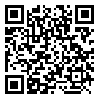مجله رویش روانشناسی از دادن گواهیهای کاغذی معذور است. لطفا تقاضا نکنید. همه گواهی ها در صفحه شخصی کاربران موجود است.
year 13, Issue 10 (Winter 2024-2025 2024)
Rooyesh 2024, 13(10): 21-28 |
Back to browse issues page
Download citation:
BibTeX | RIS | EndNote | Medlars | ProCite | Reference Manager | RefWorks
Send citation to:



BibTeX | RIS | EndNote | Medlars | ProCite | Reference Manager | RefWorks
Send citation to:
Hassanzadeh Naini A, Moeinizadeh M, Ziayaei S S, Tahmasbi Jaghargh F. (2024). Prediction of Corona anxiety based on hope and happiness in adolescent girls of Mashhad city. Rooyesh. 13(10), 21-28.
URL: http://frooyesh.ir/article-1-5354-en.html
URL: http://frooyesh.ir/article-1-5354-en.html
Atiye Hassanzadeh Naini1 
 , Majid Moeinizadeh *2
, Majid Moeinizadeh *2 
 , Seyedeh Soleil Ziayaei3
, Seyedeh Soleil Ziayaei3 
 , Fatemeh Tahmasbi Jaghargh4
, Fatemeh Tahmasbi Jaghargh4 


 , Majid Moeinizadeh *2
, Majid Moeinizadeh *2 
 , Seyedeh Soleil Ziayaei3
, Seyedeh Soleil Ziayaei3 
 , Fatemeh Tahmasbi Jaghargh4
, Fatemeh Tahmasbi Jaghargh4 

1- Master of Clinical Psychology, Department of Psychology, School of Educational Sciences and Psychology, Ferdowsi University of Mashhad, Mashhad, Iran.
2- Assistant Professor, Department of Psychology Assistant Professor, Department of Psychology, Faculty of Psychology and Educational Sciences, Ferdowsi University of Mashhad, Mashhad, Iran. ,moinyzadeh@um.ac.ir
3- Assistant Professor of Clinical Psychology, Department of Islamic Education, Research Institute of Islamic Studies in Humanities, Ferdowsi University of Mashhad, Mashhad, Iran.
4- Master's degree in educational psychology, Counseling and Educational Psychology Department, Faculty of Educational Sciences and Psychology, Ferdowsi University of Mashhad, Mashhad, Iran.
2- Assistant Professor, Department of Psychology Assistant Professor, Department of Psychology, Faculty of Psychology and Educational Sciences, Ferdowsi University of Mashhad, Mashhad, Iran. ,
3- Assistant Professor of Clinical Psychology, Department of Islamic Education, Research Institute of Islamic Studies in Humanities, Ferdowsi University of Mashhad, Mashhad, Iran.
4- Master's degree in educational psychology, Counseling and Educational Psychology Department, Faculty of Educational Sciences and Psychology, Ferdowsi University of Mashhad, Mashhad, Iran.
Abstract: (1223 Views)
The current research aimed to predict the anxiety of Corona based on hope and happiness. The current research was a descriptive-correlation type of study. The statistical database included all teenage girls in the city of Mashhad in the academic year 1400-1401. With the available sampling method, 395 people participated in the research through an Internet call. To collect data, the Corona Anxiety Questionnaire (CDAS, Alipour et al., 2018), The Miller Hope Scale (MHS, Miller, 1988), and the Oxford Happiness Questionnaire (OHI, Hills and Argyle, 2002) were used. Data analysis was done using Pearson's correlation method and stepwise regression. The findings showed that there is a negative and significant relationship between anxiety and happiness, as well as the level of hope (P<0.01). The results of the regression analysis showed that happiness and hope explained 12% of the variance of the Corona anxiety scores. Therefore, happiness and hope can play a role in the emergence of corona anxiety.
Type of Article: Research |
Subject:
Clinical Psychology
Received: 2024/05/1 | Accepted: 2024/06/15 | ePublished: 2024/12/30
Received: 2024/05/1 | Accepted: 2024/06/15 | ePublished: 2024/12/30
Send email to the article author
| Rights and permissions | |
 |
This work is licensed under a Creative Commons Attribution-NonCommercial 4.0 International License. |



